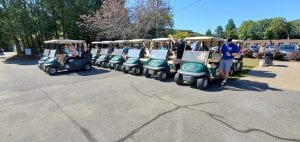The University’s Communications Department and the Division of Institutional Advancement recently hosted the 4th annual Henry Wefing Memorial Golf Classic, which raised $3,000 for a journalism scholarship.
Note: This article was written by Peter Currier and appeared in The Westfield News on Sept. 29.
The Westfield State University Communications Department and the Division of Institutional Advancement hosted the 4th annual Henry Wefing Memorial Golf Classic on Friday at the Tekoa Country Club.
Dozens of golfers took part in the shotgun-start style tournament with all 18 holes available to play on. Tickets for the tournament, otherwise known as ‘The Wef’, were $70 for students, $90 for individuals, and $350 for groups of four people.
The tournament is a fundraiser that benefits the Henry Wefing Journalism Scholarship Fund. The scholarship is given annually to WSU students studying English or journalism. An estimated $3,000 was raised in the tournament to add to the fund.
Henry Wefing was a veteran reporter and a 30 year journalism professor at WSU. In the fall semester of 2014, Wefing was diagnosed with cancer, and had to leave his position in the middle of the year.
Henry Wefing passed away the following May. During a memorial service following Wefing’s passing, WSU communications professor Tom Gardner spoke with the Wefing family about possibly starting a scholarship in the late reporter’s name. When coming up with ideas to fund the scholarship, Henry’s love for golf was brought up, and it was decided that the funds should be raised by a local golf tournament.
“He [Wefing] was a big golfer,” said Gardner, “He and his family used to play in the Carson Center Charity Golf Tournament.”

Dozens of golfers participating in the Wef wait in their golf carts before heading to their assigned first spots on the course. (Photo by Peter Currier)
This year, the winners of the tournament were the Brady family. Henry Wefing’s daughter, Laura Brady, along with her husband, Matt and their sons Kyle and Ethan, won with a score of 63, which Gardner said may be the lowest winning score in the four years of the tournament so far. They drove up from New Jersey to participate in the event.
At the dinner following the tournament, Laura told the story of how they would always participate in the Carson Center tournament with the goal of getting eight under par. She said that she thinks her father would be proud that they were able to achieve that feat in his tournament.
When the first rendition of the tournament was being organized, Gardner turned to Suzanne Boniface, another professor in the Communications Department at WSU. Boniface said that she has experience organizing golf tournaments for charity organizations, so she took the lead.
“He and I agreed to run the tournament together.” said Boniface, who added that this was the 20th golf tournament she has organized since the early 2000s.
The tournament also accepted corporate sponsors with differing levels of sponsorships. Each sponsorship level was named after a famous reporter from the 20th century. The highest sponsorship level was for $2,000 and is named for Edward R. Murrow. Others included the Walter Cronkite reception sponsorship for $1,500 and the Joseph Pullitzer lunch sponsorship for $750.
While he was on the course golfing, Gardner said that scholarships like the Henry Wefing Journalism Scholarship are important for journalism as a profession. He said a month earlier that journalism is a challenging career field at the moment, and that these scholarships help journalism students graduate with less debt.
“These are heroes going into it, so they need our support,” said Gardner, shortly after he tee’d off.
Following the tournament, a dinner for communications students and alumni was held in the Tekoa Country Club banquet hall. One of this year’s recipients of the Wefing scholarship was in attendance.
Jesse Buckman is a student at WSU who studies Media Arts and Analysis and wants to be a grant writer after he graduates. He said that part of the process of applying for the scholarship was to write an essay describing how he would use Professor Wefing’s teachings in a positive way for his career.
“It’s definitely important. It was such an honor to learn about him [Wefing] even if I never met him.” said Buckman.
